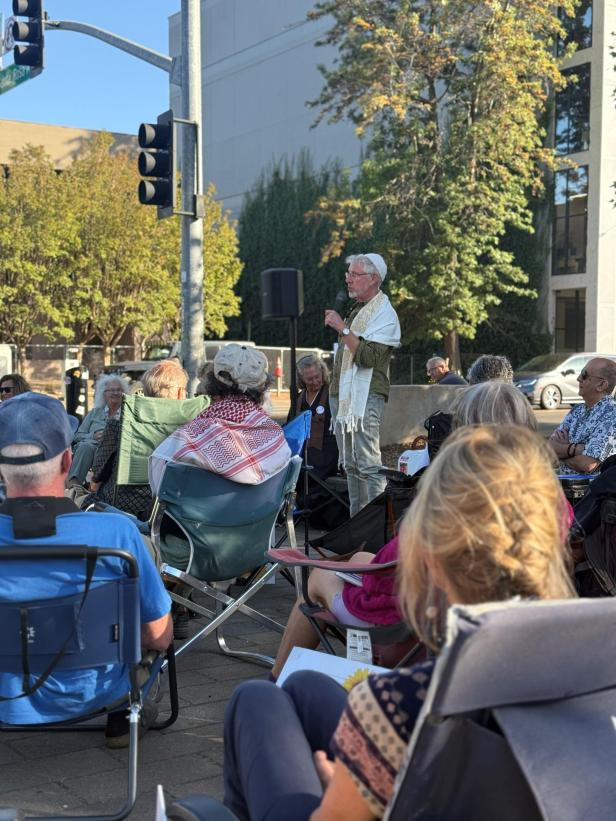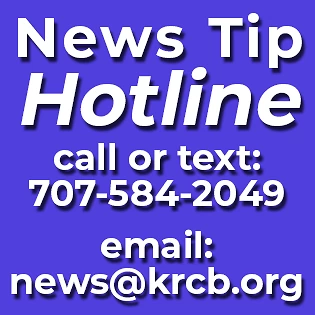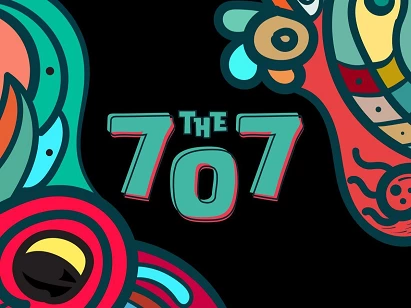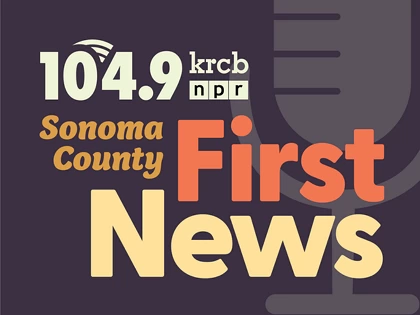 photo credit: Noah Abrams/KRCB
photo credit: Noah Abrams/KRCBRabbi Irwin Keller speaks to participants at the Interfaith Public Fast ceremony in Santa
Rosa's Courthouse Square on Wednesday, July 2, 2025.
Interfaith leaders from across Sonoma County recently engaged in a 12-hour public fast, and broke it at a ceremony in Santa Rosa's Courthouse Square.
The goal: calling attention to the suffering of immigrants, LGBTQ+ individuals, and other vulnerable communities targeted by the current federal administration.
On the pleasant early July evening in Courthouse Square, most people downtown were enjoying a drink or some window shopping, but a small group meditated in silence in the square's southwest corner.
They were preparing to eat their first meal of the day.
Addressing the crowd was Rabbi Irwin Keller.
"This is a practice to remind us what it is like to be in compassion, to be in solidarity, to be in witness over time," Keller said. "Not just to show up and then go home."
The nearly 100 strong group in the square was composed of different faiths.
Among them were Jewish fasters like Keller, rabbi at Cotati's Congregation Ner Shalom, as well as Buddhists from Sebastopol’s Dharma Heart Zen, and Christians from congregations around the county like the Redwood Forest Friends Meeting.
They’d not eaten or drank since seven in the morning, in support of Sonoma County’s migrant community, and as a symbol of non-violent resistance against fascism.
Fasting as a form of protest is nothing new.
Activists like Gandhi and Cesar Chávez frequently went on hunger strike to achieve political or social change.
It’s also common across many faiths as a way to mourn and reflect, said Reverend Lindsey Bell-Kerr, of Santa Rosa’s Christ Church United Methodist.
"When you're fasting, you're literally saying, I will not consume anything," Bell-Kerr said. "You cannot sell me anything while I'm fasting."
Bell-Kerr said the fast isn't just about abstaining from eating or drinking either, she said it’s about actively stepping back from other forms of distracting consumption or convenience like driving a car.
Others said they participated in the fast not only to resist against fascism, but to stand in solidarity with all oppressed people around the world.
For local Palestinian-American activist Therese Mughannam-Walrath, it was an effort to experience how people who go hungry involuntarily, like those in Gaza, are feeling.
“I have a choice," Mughannam-Walrath said. "I have lots of food in my fridge, but so many people do not have that choice.”
Reverend Bell-Kerr shared a similar sentiment and noted that most of the people who harvest crops in the United States are migrant workers, and often do not have enough food to eat and survive on.
"So if at any point in the day anyone participating in the fast started to feel cranky or hungry, I think that's a good sign," Bell-Kerr said. "[Because] that's a reminder that there is injustice."
The Interfaith Public Fasts are far from over. Reverend Bell-Kerr said that they already have another one scheduled at the Sonoma County Board of Supervisors meeting on August 12.

 Live Radio
Live Radio




